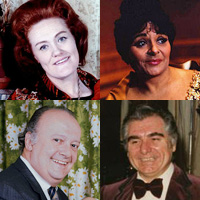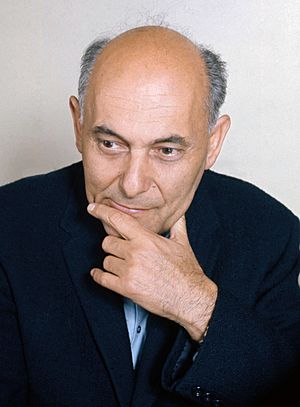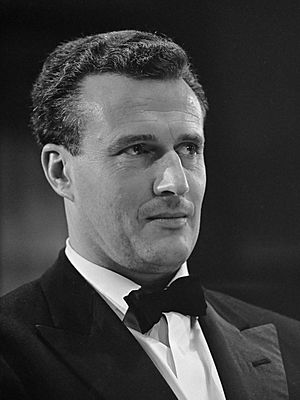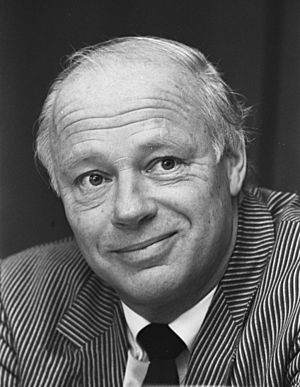The Royal Opera facts for kids
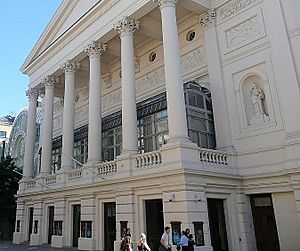
The Royal Opera is a famous opera company in London, England. It performs at the Royal Opera House in Covent Garden. It's one of the two main opera companies in London, the other being English National Opera.
The company started in 1946 as the Covent Garden Opera Company. It changed its name to The Royal Opera in 1968. Before this, the Royal Opera House only had short opera seasons. The new company brought long, regular seasons and steady management. It has always shared the Royal Opera House with The Royal Ballet, a dance company. Both companies are part of a larger group called the Royal Ballet and Opera.
When it first started, the company performed all operas in English. But since the late 1950s, most operas are sung in their original language. The performers include British and Commonwealth singers, along with famous international guest stars. Many famous singers have performed here, like Maria Callas, Plácido Domingo, and Luciano Pavarotti. Some singers who started with the company, like Joan Sutherland and Kiri Te Kanawa, became world-famous.
The company grew a lot under David Webster's leadership. It became as good as the world's best opera houses. After Webster, John Tooley helped it continue to do well. However, the Royal Opera House closed for big renovations between 1997 and 1999. Since 2000, the company has had steady leadership again. It has had seven music directors, including Georg Solti, Colin Davis, and currently Jakub Hrůša.
Contents
History of The Royal Opera
How it Started
Opera has been performed at the Royal Opera House in Covent Garden since the mid-1800s. After a fire, a new building opened in 1858. Before World War II, different groups would put on short opera seasons there. These shows featured famous singers and conductors.
During the war, the Royal Opera House was used as a dance hall. After the war, the owners wanted opera and ballet to return. They asked a music company, Boosey and Hawkes, to help. Boosey and Hawkes then set up a charity to run the opera house.
Some people wanted to go back to the old way of having short seasons with international stars. Thomas Beecham, a famous conductor, expected to lead these seasons again. But David Webster, the new chief executive, wanted to have opera all year round. He wanted a resident company that would sing in English. Webster got money from the British government to start this new opera company.
Early Years: 1946–1949
Webster's first job was to find a music director. He chose Karl Rankl, an Austrian conductor. Rankl had a lot of experience running opera companies in Europe. He agreed to build a new company from scratch, including singers and an orchestra.
The new company first performed with the Sadler's Wells Ballet Company on December 12, 1946. Their first opera performance alone was Carmen on January 14, 1947. Critics liked it, saying the music was good and the English words were clear.
At first, all the singers were from Britain or the Commonwealth. Later, famous European singers like Elisabeth Schwarzkopf joined. Some international stars, like Kirsten Flagstad, even learned their roles in English. However, by 1948, the idea of singing only in English started to change. Some Wagner operas had to be sung in German to get the best singers. Rankl left in 1951, as the company had grown beyond his early leadership.
In these early years, the company wanted to be new and open to everyone. Ticket prices were kept low. They performed classic operas and new works by composers like Benjamin Britten. A young director named Peter Brook brought fresh ideas to the stage.
The 1950s: Growing Fame
After Rankl left, the company used many guest conductors. In 1954, Rafael Kubelík became the new music director. He believed operas should be sung in English so the audience could understand. But some, like Beecham, disagreed, saying it was hard to find enough top English-speaking opera stars.
Despite this, by the mid-1950s, many British and Commonwealth singers at Covent Garden became very popular. These included Joan Sutherland and Geraint Evans. However, to reach the highest international level, the company started using more international guest singers. These included stars like Maria Callas and Birgit Nilsson.
The audience also preferred operas in their original language. By 1959, shows sung in original languages with higher ticket prices had much better attendance. The policy of singing in English slowly faded away, even if it was never officially stopped.
By the end of the 1950s, Covent Garden was becoming one of the world's best opera companies. Two major productions helped its reputation. In 1957, they performed Berlioz's huge opera The Trojans. In 1958, for the theatre's 100th birthday, they staged Verdi's Don Carlos. Both shows were huge successes.
The 1960s: Royal Recognition
In 1961, Georg Solti became the new music director. He had led opera houses in Germany before. Solti also supported developing British singers. He often chose them for important shows and recordings.
Even though Solti believed in singing in English, famous singers like Callas refused to perform in translation. Also, English-speaking singers wanted to learn roles in the original language so they could perform worldwide. So, more and more productions were in their original languages.
By 1967, people expected every new show at Covent Garden to have top singers and be presented as well as any in New York or Milan. The company performed a mix of popular operas and less common ones. Composers like Verdi, Puccini, and Mozart were often featured. They also performed works by Benjamin Britten and Michael Tippett.
The company also performed outside the Royal Opera House. They gave concerts at the Proms in London every year. In 1970, Solti led the company on a tour to Germany. The audiences there loved their performances.
In 1968, the Queen gave the company the title "The Royal Opera." It was a big honor, showing how important the company had become.
1970 to 1986: Colin Davis's Era
John Tooley took over from David Webster in 1970. Webster had suggested Colin Davis as the next music director. Davis started in 1971.
Davis faced some challenges at first. But his performances of Mozart operas were very popular. He also brought back less-known operas like La clemenza di Tito.
Under Davis, the opera house started "promenade performances." These allowed young people and others who couldn't afford expensive tickets to sit on the floor for a low price. Davis conducted over 30 operas during his 15 years. He also invited many famous guest conductors, like Carlos Kleiber and Claudio Abbado.
Star singers during this time included Luciano Pavarotti and Montserrat Caballé. British singers like Janet Baker also performed. Davis's time as music director ended in 1986 with a special low-price performance of Fidelio.
1987 to 2002: Challenges and Rebuilding
Bernard Haitink became the new music director after Davis. He was known for his excellent performances. His time started well with successful Mozart operas.
However, the Royal Opera House faced many management problems during this period. John Tooley retired in 1988, and new leaders struggled. There were also financial issues, leading to higher ticket prices. A 1996 TV show called The House showed the backstage chaos, which made things worse.
The biggest challenge was the closure of the Royal Opera House for major rebuilding from 1997 to 1999. This left the opera and ballet companies without a home. Haitink almost left, but he was convinced to stay. The company performed in temporary places, including a highly praised Ring cycle at the Royal Albert Hall.
After several changes in leadership, Michael Kaiser became general director in 1998. He helped fix the company's finances and oversaw the reopening of the opera house. The beautifully restored Royal Opera House reopened in December 1999 with Falstaff.
2002 to Today: New Stability
After years of problems, the Royal Opera House became stable again in 2001 with Tony Hall as chief executive. In 2002, Antonio Pappano became the music director of The Royal Opera.
After the rebuilding, a smaller theatre called the Linbury Studio Theatre opened. It's used for smaller shows and new works. The Royal Opera also has a program called the Jette Parker Young Artists Programme. It helps young singers start their careers.
Since 2002, The Royal Opera has performed many well-known operas and some less common ones. These include works by Thomas Adès and Harrison Birtwistle. Pappano's Ring cycle, completed in 2007, was praised for its music. Former music directors, Davis and Haitink, have also returned as guest conductors.
The company toured Japan in 2010. While they were away, a smaller group performed in London. The Royal Opera House receives money from the government, but it still relies a lot on ticket sales compared to opera houses in other countries.
In recent years, The Royal Opera performs about 150 shows each season, from September to July. They put on about 20 different operas, with nearly half being new productions. In 2011, Kasper Holten became Director of The Royal Opera.
The company continues to stage around 20 productions each season, with about seven new ones. They have also worked with other groups, like Welsh National Opera and Shakespeare's Globe.
In March 2021, it was announced that Antonio Pappano would leave his role as music director at the end of the 2023-2024 season.
Jakub Hrůša first conducted at the Royal Opera House in 2018. In October 2022, he was announced as the next music director, starting in September 2025. Hrůša and Pappano will share responsibilities during the 2024-2025 season.
In February 2025, a new opera called "Festen" premiered at the Royal Opera House. It was nominated for an award.
Managerial and Musical Heads, 1946 to Date
| Royal Opera House Chief executive |
Opera company Music Director |
Director of Opera | Notes and references |
|---|---|---|---|
| 1946–1970 David Webster |
1946–1951 Karl Rankl |
none | From 1946 to 1980, the Chief Executive was called "General Administrator" |
| none | – | ||
| 1955–1958 Rafael Kubelík |
– | ||
| none | 1959–1960 Lord Harewood |
Lord Harewood's title was "Controller of Opera Planning" | |
| 1960–1962 Bernard Keeffe |
Keeffe's title was "Controller of Opera Planning" | ||
| 1961–1971 Georg Solti |
– | ||
| 1962–1971 Joan Ingpen |
Ingpen's title was "Controller of Opera Planning" | ||
| 1970–1988 John Tooley |
From 1980, Tooley's title was "General Director" | ||
| 1971–1986 Colin Davis |
none | – | |
| 1973–1981 Helga Schmidt |
Schmidt's title was first "Head of Opera Planning" then "Artistic Administrator" |
||
| 1983–1987 Peter Katona |
Katona's title was "Artistic Administrator" He is currently "Director of Casting" |
||
| 1987–2002 Bernard Haitink |
1987–1993 Paul Findlay |
Since the 1980s, the title "Music Director" has been used instead of "Musical Director" Findlay's title was "Opera Director" |
|
| 1988–1996 Jeremy Isaacs |
Isaacs's title was "General Director" | ||
| 1993–1998 Nicholas Payne |
Payne's title was "Opera Director" | ||
| January – May 1997 Genista McIntosh |
McIntosh's title was "Chief executive" | ||
| September 1997 – March 1998 Mary Allen |
Allen's title was "Chief executive" | ||
| September 1998 – June 2000 Michael Kaiser |
none | Kaiser's title was "Chief executive" | |
| none | 2000–2011 Elaine Padmore |
Padmore's title was "Director of Opera" | |
| May 2001 – 2013 Tony Hall |
Hall's title was "Chief executive" | ||
| 2002–2024 Antonio Pappano |
– | ||
| 2011–2017 Kasper Holten |
Holten's title was "Director of Opera" | ||
| 2013–present Alex Beard |
Beard's title is "Chief executive" | ||
| 2017–present Oliver Mears |
Mears's title is "Director of Opera" | ||
| 2025–presentJakub Hrůša |
See also
 In Spanish: Royal Opera, Londres para niños
In Spanish: Royal Opera, Londres para niños
- Owners, lessees and managers of the Royal Opera House, Covent Garden
Images for kids
 | Audre Lorde |
 | John Berry Meachum |
 | Ferdinand Lee Barnett |


